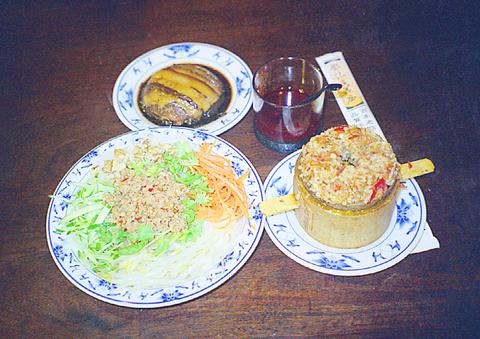The fact that the Dengji Dan-Dan Noodles restaurant is located on a lane opposite Taipei's restaurant-loaded Yangkang Street
Until recently the famous small eats restaurant had all the hallmarks of a spit and sawdust eatery. A change of address and a facelift, however, have now transformed it into something other than an Oriental fast-food joint.

PHOTO: GAVIN PHIPPS, TAIPEI TIMES
Now located on the opposite side of the street, the restaurant's once-sparse interior now boasts old Chinese-style wooden furniture and other such old-world-style Oriental trimmings.
The decor and address may have changed, but the quality of the food certainly hasn't. For almost 40 years successive Lao Deng managers have not only managed to keep the recipe for the chili and peanut based sauce that covers the joint's specialty dish of dan-dan mien NT$50
One of the most mouth-watering of their creations is the oily chili sauce that covers the joint's bite-sized dumplings. The freshly made dumplings
The thin soft pastry wrapping melts in the mouth and the meaty filling remains in one piece and doesn't spill out and fall listlessly onto the table top or diners' laps. The dumplings are also available for the same price without the chili sauce, which is instead replaced by clear oil
It is the joint's various flavors and styles of noodles, however, that remain the crux of any meal at the Dengji.
Along with dan dan noodles, other noodle dishes worth chowing down on include hot and sour noodles NT$60
While noodles remain the restaurant's big draw, there are still plenty of equally tasty rice-based dishes on the menu. Dishes such as pig trotter rice NT$100

June 9 to June 15 A photo of two men riding trendy high-wheel Penny-Farthing bicycles past a Qing Dynasty gate aptly captures the essence of Taipei in 1897 — a newly colonized city on the cusp of great change. The Japanese began making significant modifications to the cityscape in 1899, tearing down Qing-era structures, widening boulevards and installing Western-style infrastructure and buildings. The photographer, Minosuke Imamura, only spent a year in Taiwan as a cartographer for the governor-general’s office, but he left behind a treasure trove of 130 images showing life at the onset of Japanese rule, spanning July 1897 to

In an interview posted online by United Daily News (UDN) on May 26, current Chinese Nationalist Party (KMT) Chairman Eric Chu (朱立倫) was asked about Taichung Mayor Lu Shiow-yen (盧秀燕) replacing him as party chair. Though not yet officially running, by the customs of Taiwan politics, Lu has been signalling she is both running for party chair and to be the party’s 2028 presidential candidate. She told an international media outlet that she was considering a run. She also gave a speech in Keelung on national priorities and foreign affairs. For details, see the May 23 edition of this column,

The Taiwan People’s Party (TPP) on May 18 held a rally in Taichung to mark the anniversary of President William Lai’s (賴清德) inauguration on May 20. The title of the rally could be loosely translated to “May 18 recall fraudulent goods” (518退貨ㄌㄨㄚˋ!). Unlike in English, where the terms are the same, “recall” (退貨) in this context refers to product recalls due to damaged, defective or fraudulent merchandise, not the political recalls (罷免) currently dominating the headlines. I attended the rally to determine if the impression was correct that the TPP under party Chairman Huang Kuo-Chang (黃國昌) had little of a

At Computex 2025, Nvidia CEO Jensen Huang (黃仁勳) urged the government to subsidize AI. “All schools in Taiwan must integrate AI into their curricula,” he declared. A few months earlier, he said, “If I were a student today, I’d immediately start using tools like ChatGPT, Gemini Pro and Grok to learn, write and accelerate my thinking.” Huang sees the AI-bullet train leaving the station. And as one of its drivers, he’s worried about youth not getting on board — bad for their careers, and bad for his workforce. As a semiconductor supply-chain powerhouse and AI hub wannabe, Taiwan is seeing